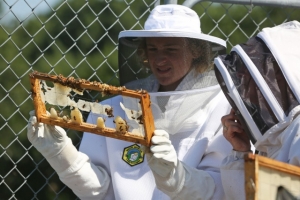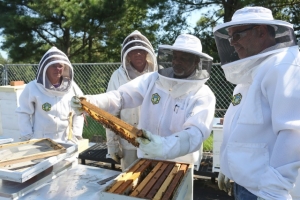Buzz of the hive
By Steve Herring
Published in News on August 9, 2018 5:50 AM

News-Argus/CASEY MOZINGO
Joseph Guillemette and Dr. Kirby Harris look at a frame and discuss what they think is the reason the bees are eating the wax from the frame Wednesday as beekeepers check hives on Old Smithfield Road.

News-Argus/CASEY MOZINGO
Anthony Winn, right of center, pulls out a frame from a hive off of Old Smithfield Road Wednesday as he and other Beekeepers of the Neuse check the hives.
Most people would be leery of approaching the hundreds of bees flying around the series of beehives near the old Cherry Hospital campus.
James Dove isn't one of them.
For him, the buzz of the hive is relaxing enough to lie down and take a nap among them.
Dove and other members of Beekeepers of the Neuse are looking forward to sharing their love and interest in bees with the public during the annual National Honey Bee Day Celebration from 9 a.m. to 3 p.m. on Saturday, Aug. 18, at Waynesborough Park. The park is located along U.S. 117 South.
It will be a time to help educate the public about honeybees, their importance to agriculture and hopefully to help people overcome their fear, he said.
It also is a way to introduce the public to beekeeping as a hobby,
The free event will be held rain or shine.
"National Honey Bee Day is a celebration on honeybees across the nation," Dove said. "It is a national date when clubs get together and make sure we have some kind of carnival. It is basically for communicating to the public and letting them know about honeybees, about the importance of honeybees.
"If a person is interested in getting into beekeeping, we are there to provide some demonstrations. We will have a live observation colony with bees in it. People can observe how bees work and communicate with one another."
There will be demonstrations on how to melt beeswax and equipment displays on different kinds of beehives.
"There will be candle making for the kids," Dove said. "They will leave there with a natural beeswax candle.
"There will be facepainting for the children. It will be fun for the entire family to get together."
Club members also will be selling honey.
Other vendors will be selling knick-knacks, arts and crafts and products made from honey or beeswax such as hand cream.
The Wayne County Master Gardeners will have demonstrations as well.
When people think about bees the first thing they think about is honey and then being stung, Dove said.
"But honeybees are prolific pollinators," he said. "We have a lot of natural pollinators. We have 2,000 different species of bees, pollinators, but the honeybee is different because of the number."
A large bumblebee colony will have only 300 bees in it compared to a normal honeybee colony that will have between 30,000 and 50,000 bees, he said.
Honeybees also are transportable, he said.
The hives can be taken to a field to pollinate crops, he said.
Also, eastern North Carolina honeybees are shipped to California to help pollinate the almond crops since the state does not have enough honeybees, Dove said
The club's apriary (collection of beehives), sponsored by the Farm Bureau, near the old Cherry Hospital campus, is used as a training ground for new and older beekeepers.
"We do a lot of demonstrations out here about pest management, how to multiply hives, how to split hives, control your hives," Dove said.
Dove said he would have never thought he would become a beekeeper.
"My mother passed in 2014, and my sister and I retired about the some time," he said. "She came by one day and said, 'I am going to take a beekeeping class.'
"I said, 'I'll take that class with you,' -- you know, do some things together with my sister. So we got in the class and got us two hives apiece and within 74 hours, we wound up with four hives apiece. They multiplied on us."
That was an interesting experience for a beginning beekeeper, and the more Dove learned about the bees, the more intrigued he became.
Bees are something you would never understand completely -- the colony itself is a superorganism in the way that the bees work together, Dove said.
Dove said he simply loves working with bees and working to obtain higher beekeeping certifications because it is a challenge to figure the bees out, to help them out and support them.
"They are just wonderful creatures," he said. "It is kind of like watching an aquarium. It is calming. People want to know how can you be so calm around 50,000 stingers?
"But it is really calming. If they get to know you, they get more familiar and they are pretty calm."
Dove said he has been stung a few times. But you learn that is part of the fun, he said.
One of the first lessons to learn is not to swat at bees, he said.
Bees communicate if they don't want to be bothered that day, Dove said.
"They bump you and kind of communicate for you to back off," he said. "The noise of the hive will rise, and you just understand listening to the bees, watching bees, and you just kind of respond to their communication, and you just kind of leave them alone for a while.
"Then they allow you to come back and start working with them again."
Beekeepers of the Neuse holds a a beekeepers school beginning the second week in January.
The club meets every third Tuesday at 7 p.m. in the Maxwell Center. The public is welcome. For more information, visit www.beekeepersoftheneuse.com.
